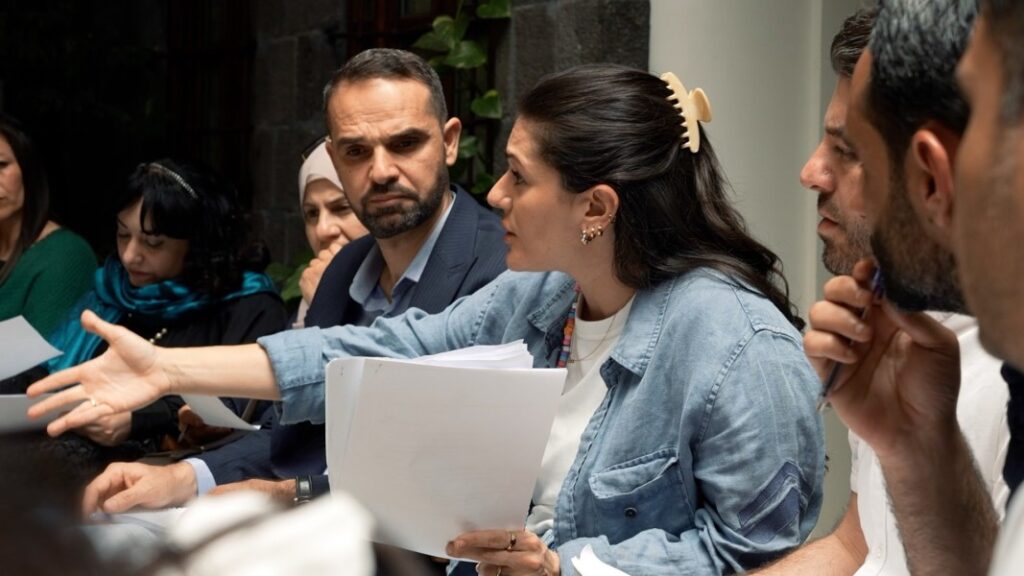

The International Center for Transitional Justice (ICTJ) and its partners in the Bridges of Truth project are hosting an event in Damascus on October 7 to present findings from their recent report on the community dialogues held in April in Syria and to commemorate the project’s eighth anniversary. The event will bring together a wide range of civil society representatives, victims and family members, government officials, and international policymakers to discuss lessons learned from the dialogues and their potential contribution to ongoing justice efforts in Syria.
The Bridges of Truth project is a collaboration among ICTJ and seven leading Syrian civil society organizations: Syrian Center for Media and Freedom of Expression, the Center for Civil Society and Democracy, Dawlaty, Badael, The Day After, Lawyers and Doctors for Human Rights, and the Syrian Institute for Justice. Launched in 2017, the project raises awareness about the plight of detainees, the forcibly disappeared, and their families, and advocates for justice for the innumerable victims of the Syrian conflict and the former regime’s repression.
This past April, the Bridges of Truth team visited Syria for the first time since the fall of the Bashar al-Assad regime in December 2024. For years, the project team had conducted its work from abroad, given the ongoing violence and repression there. As a first activity in the country, the team organized seven community dialogue sessions in various cities, during which 133 local men, women, and youth from diverse communities shared their stories and hardships, discussed their needs, and voiced their hopes for justice, reconstruction, and reconciliation.
The Bridges of Truth team subsequently produced the report “Our Pain Turned into Policy,” which gathers some of the views expressed in the dialogues, offers an analysis of the way forward for transitional justice in Syria, and proposes a number of actionable steps in the near term to foster peace and security and advance justice. “The report has provided us with a deeper understanding of the needs and challenges faced by Syrians, who in turn have demonstrated a collective desire for justice,” said Nousha Kabawat, head of ICTJ’s Syria program. “Participants have stressed that justice must be inclusive, transparent, and built from the bottom up.”
The dialogues and resulting report moreover represent the Bridges of Truth project’s first achievement inside Syria. “The road has not been easy, but years of cumulative work are now translated into this report, which marks an important milestone and the beginning of a new phase with broader horizons, a stronger presence on the ground, and an unwavering will,” reflected Rula Baghdadi, Dawlaty’s executive director.
The event on October 7 also celebrates the Bridges of Truth project’s eighth anniversary. Over the years, the collaboration has tirelessly advocated for the rights of Syrian victims and their families and led pioneering work on truth and accountability. Through groundbreaking research, it has brought to light the conflict’s devastating impact on children, the detained and forcibly disappeared, and their families. Through regular consultations, it has helped victims and their families come together and articulate their needs and demands for justice. Moreover, it has helped advance these demands of both those living abroad and victims in Syria whose voices would not have been otherwise adequately heard.
According to Dr. Mahmoud Aswad, executive director of Lawyers and Doctors for Human Rights, the willingness of the member organizations to learn and progress together, along with their commitment to knowledge sharing, pragmatism, and collective leadership, have been key factors in sustaining the project’s cohesion over the years. Muhannad Sharabati, director of the Violations Documentation Project at the Syrian Center for Media and Freedom of Expression, concurred. “What sets Bridges of Truth apart is its flexibility and cohesion, which was reflected in its swift response after the fall of the regime, by organizing community consultations in several areas inside Syria.”

